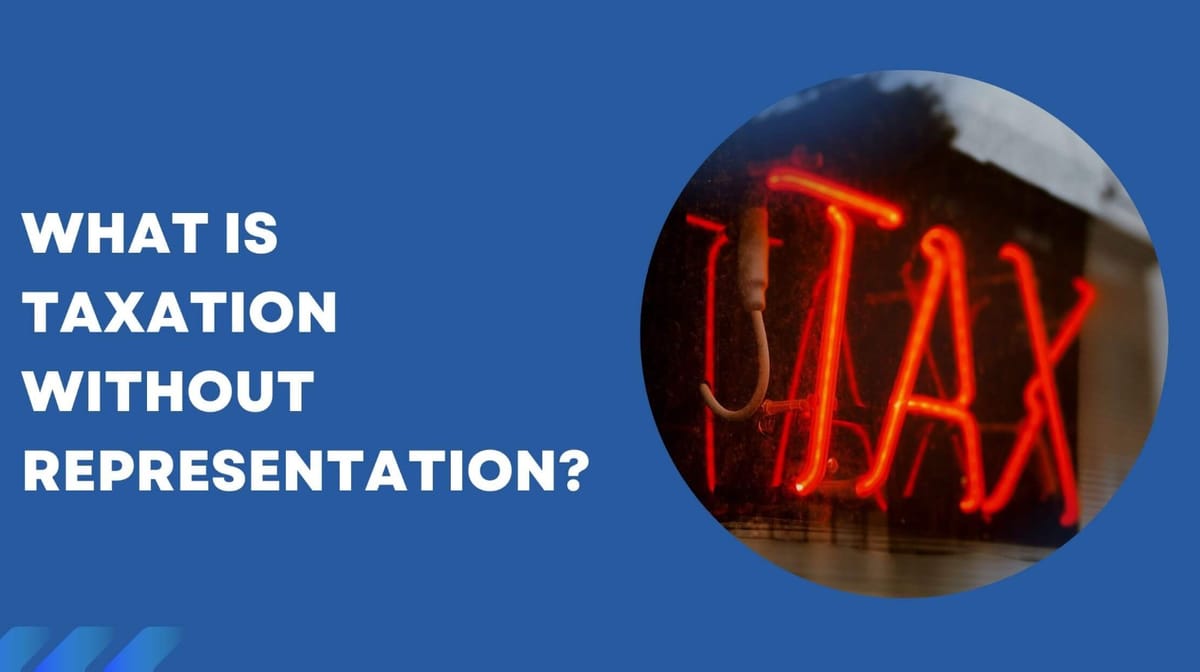What Does Taxation Without Representation Mean?

Taxation without representation is a phrase that has echoed through history, symbolizing the struggle for fair governance and civil rights. While it’s most famously associated with the American Revolution, the concept remains relevant today. This article delves into the meaning of taxation without representation, its historical context, and its ongoing implications in modern society.
Introduction to Taxation Without Representation
Taxation without representation refers to the imposition of taxes on a populace by a governing body without the consent of the governed or their elected representatives. This principle lies at the heart of democratic governance, asserting that citizens should have a voice in the laws and policies that affect them, particularly in how their taxes are levied and spent.
Historical Context
To fully understand the significance of taxation without representation, it’s essential to explore its historical roots. The concept played a pivotal role in the American colonies' quest for independence from British rule in the 18th century.
Colonial America and British Taxation
In the mid-18th century, the British government imposed a series of taxes on the American colonies without granting them representation in the British Parliament. Notable taxes included the Sugar Act, the Stamp Act, and the Townshend Acts. These taxes were seen as unfair and oppressive, fueling resentment among colonists.
The Stamp Act of 1765
One of the most infamous examples was the Stamp Act of 1765, which required colonists to purchase a stamp for every piece of paper they used, from newspapers to legal documents. This act affected virtually everyone in the colonies and led to widespread protest.
The Rallying Cry
The colonists coined the phrase "No taxation without representation" as a rallying cry against these taxes. They argued that it was unjust to be taxed by a government in which they had no representation. This sentiment was a driving force behind the American Revolution.
The Principles Behind the Phrase
The principle of taxation without representation is rooted in the idea that legitimate government authority derives from the consent of the governed. Here are some key components of this principle:
Consent of the Governed
The consent of the governed is a fundamental tenet of democracy. It means that a government's legitimacy comes from the people it governs. Without representation, the people cannot consent to the laws and taxes imposed on them.
Representation in Governance
Representation ensures that citizens have a voice in the legislative process. Elected representatives are accountable to their constituents and can advocate for their interests. This representation is crucial for fair and just governance.
Fair Taxation
Fair taxation involves not only the consent of the governed but also equitable distribution of the tax burden. Representation helps ensure that taxes are levied fairly and used for the common good.
Impact on American Independence
The principle of taxation without representation had a profound impact on the American colonies and their struggle for independence. Here’s how it influenced the course of history:
The Formation of the Continental Congress
In response to British taxes and policies, the colonies formed the Continental Congress in 1774. This body served as a unified voice for the colonies and coordinated their resistance against British rule.
The Declaration of Independence
The principle of taxation without representation was a key grievance outlined in the Declaration of Independence. The document, drafted by Thomas Jefferson in 1776, stated that one of the reasons for seeking independence was the British government's imposition of taxes without consent.
The Revolutionary War
The principle also fueled the American Revolutionary War, as colonists fought to establish a government that respected their rights and granted them representation. The war ultimately led to the formation of the United States of America, a nation built on democratic principles.
Taxation Without Representation in Modern Times
While the American Revolution addressed the issue of taxation without representation in the 18th century, the concept remains relevant today. Here are some modern examples and their implications:
Washington, D.C.

Residents of Washington, D.C., face a unique situation. Although they pay federal taxes, they do not have voting representation in Congress. This has led to ongoing debates and movements advocating for D.C. statehood or increased representation.
Territories of the United States
Similar issues affect residents of U.S. territories like Puerto Rico, Guam, and the U.S. Virgin Islands. These territories have non-voting representatives in Congress and limited say in federal legislation, despite being subject to many federal laws and taxes.
Global Perspectives
The principle of taxation without representation is not limited to the United States. It resonates globally, particularly in regions where people are taxed by governments they do not elect. This issue is often at the heart of movements for greater autonomy and democratic reforms.
The Importance of Representation in Modern Governance
The ongoing relevance of taxation without representation highlights the importance of representation in modern governance. Here’s why it matters:
Ensuring Accountability
Representation holds elected officials accountable to their constituents. When citizens have a voice in government, they can advocate for their needs and hold leaders responsible for their actions.
Promoting Fairness
Representation helps ensure that laws and policies, including tax policies, are fair and equitable. It allows for diverse perspectives to be considered, leading to more balanced decision-making.
Protecting Rights
Democratic representation protects individual rights by giving people a say in how they are governed. It ensures that government actions reflect the will of the people, safeguarding against arbitrary rule.
Challenges and Controversies
While the principle of taxation without representation is widely accepted, its implementation can be challenging and controversial. Here are some common issues:
Gerrymandering
Gerrymandering is the practice of manipulating electoral district boundaries to favor a particular political party. This can undermine representation by diluting the voting power of certain groups.
Voter Suppression
Voter suppression tactics, such as strict voter ID laws and limited polling places, can disenfranchise certain populations, effectively reducing their representation in government.
Economic Disparities
Economic disparities can also impact representation. Wealthier individuals and groups often have more resources to influence political processes, leading to unequal representation and policy outcomes.
FAQs
What is the historical significance of "No taxation without representation"?
The phrase was a key grievance leading to the American Revolution, symbolizing the colonists' demand for fair representation in the British Parliament and their right to consent to taxes.
Why is representation important in a democracy?
Representation ensures that citizens have a voice in government, promotes accountability, protects individual rights, and helps ensure fair and equitable policies.
How does gerrymandering affect representation?
Gerrymandering manipulates electoral district boundaries to favor a particular party, undermining fair representation by diluting the voting power of certain groups.
What are the challenges faced by residents of Washington, D.C., regarding representation?
Residents of Washington, D.C., pay federal taxes but lack voting representation in Congress, leading to ongoing debates about D.C. statehood or increased representation.
How does taxation without representation affect U.S. territories?
Residents of U.S. territories like Puerto Rico have limited representation in Congress and face challenges in having their interests adequately represented in federal legislation.
What can be done to address issues of taxation without representation in modern times?
Potential solutions include advocating for statehood or increased representation for affected areas, addressing gerrymandering and voter suppression, and promoting policies that ensure fair representation.
Conclusion
The concept of taxation without representation is deeply embedded in the principles of democracy and fair governance. While its most famous application was in the context of the American Revolution, the idea remains relevant today. Ensuring that citizens have a voice in their government, particularly in how taxes are levied and spent, is crucial for maintaining a just and equitable society.
Understanding the historical context and modern implications of taxation without representation helps us appreciate the importance of democratic representation and the ongoing efforts to achieve it for all. As we continue to address issues of representation and fairness in governance, the lessons from history remind us of the value of consent and participation in the democratic process.




